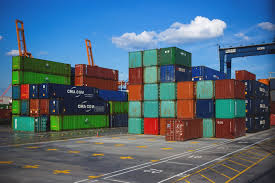business-services

March 29,2025 • 2 min read
The Rise of Shipping Containers: Revolutionizing Global Trade

Introduction
The advent of shipping containers has transformed global trade, creating a seamless, standardized system for transporting goods worldwide. Since their introduction in the mid-20th century, shipping containers have increased efficiency, reduced costs, and fostered economic growth by making international trade more accessible and reliable. This article explores how shipping containers have revolutionized global trade and continue to shape modern logistics.
The Birth of Shipping Containers
Before the widespread use of shipping containers, cargo transport was a labor-intensive and time-consuming process. Goods were loaded and unloaded manually, often resulting in delays, damage, and theft. In the 1950s, American entrepreneur Malcolm McLean introduced the standardized shipping container, a development that changed the logistics industry forever. These containers allowed goods to be transported more securely and efficiently, leading to faster turnaround times at ports and reduced shipping costs.
The Impact on Global Trade
The adoption of shipping containers has significantly impacted global trade in several ways:
-
Increased Efficiency – Containers can be easily transferred between ships, trucks, and trains, reducing the time needed to handle goods.
-
Lower Costs – Standardized containerization has minimized labor costs, storage expenses, and losses due to theft or damage.
-
Enhanced Security – Goods stored in sealed containers experience less pilferage and contamination.
-
Boost to International Trade – Countries with well-developed port infrastructure have experienced economic growth due to increased exports and imports.
-
Shipping Containers and Modern Logistics
Today, shipping containers are integral to logistics. They enable seamless transportation across different modes, such as ships, railroads, and trucks. Companies increasingly invest in Conrail Climate controlled storage, which provides a safe environment for temperature-sensitive goods like pharmaceuticals and perishable foods.
The Future of Shipping Containers
As global trade continues to expand, shipping containers will play an even greater role in logistics. Innovations such as smart containers equipped with tracking and monitoring technology will enhance efficiency and security. Moreover, sustainability efforts, including recyclable container materials and energy-efficient shipping methods, will help reduce the industry's environmental impact.
Conclusion
Shipping containers have revolutionized global trade, making it more efficient, secure, and cost-effective. Their continued evolution, including advancements like Conrail Climate controlled storage, ensures that they will remain essential in modern logistics and international commerce for years to come.
Greener livingtoday Details
User Profile
- Full name
- Greener livingtoday
- Email address
- greenerlivingtoday786@gmail.com
- Join Date
- 2025-03-29
- State
- City
- Pincode
- Address
- Follow us on Facebook
- Follow us on Twitter
- Website Name
- Bio